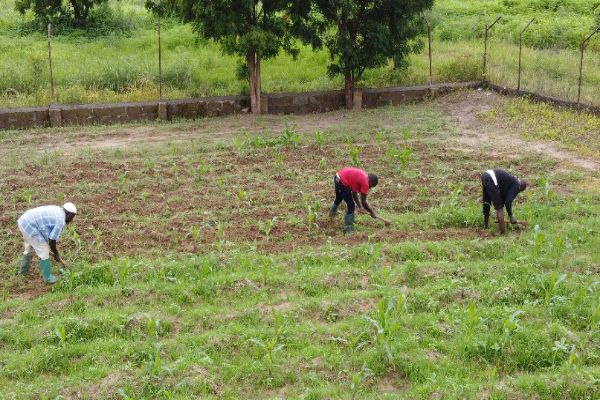Farmers across the South-South states of Delta, Bayelsa, and Edo have lamented the sudden drop in prices of staple foods, blaming it on the Federal Government’s recent food import policy.
They described the policy as a setback to their huge investments during the 2025 farming season and warned that it could have negative consequences on the 2026 season unless the government intervenes with post-harvest facilities and measures to stabilise prices.
In interviews with reporters, the farmers noted that the combination of abundant harvests, the Federal Government’s food importation policy, and lingering structural challenges had left many producers counting losses instead of profits.
In Asaba, the Delta State Chairman of the Rice Farmers Association of Nigeria (RIFAN), Mr. Sylvanus Ejezie, said most farmers had taken loans to expand their farms, expecting good returns, but were now unable to repay due to the crash in prices.
“This year’s harvest is good compared to last year — no floods, fewer herder clashes, and more people went into farming. But the government’s import policy crashed prices below expectations,” Ejezie said.
According to him, a 50kg bag of locally produced rice that sold for between ₦75,000 and ₦80,000 a few months ago now sells for between ₦55,000 and ₦57,000.
“We are not happy because the importation of cereals like rice, maize, and beans has made the locally produced ones less valuable.
Those who borrowed money are finding it difficult to repay. I spent over ₦5 million this season, but my returns can’t even cover half of the cost of production,” he lamented.
Ejezie added that the high cost of farm inputs such as NPK and Urea fertilisers, now selling for between ₦36,000 and ₦40,000 per bag, had worsened the situation.
He called on the government to provide farmers with storage facilities and subsidies to sustain production next season.
“If we had good storage systems, the government could buy off our surplus or pay compensatory subsidies. Without that, many farmers will quit in 2026,” he warned.
For Mrs. Awele Okocha, a cassava farmer in Delta, the situation has been devastating.
“A bag of garri that used to sell for between ₦12,000 and ₦15,000 now goes for as low as ₦6,000. I’ve stopped processing cassava because it’s cheaper to buy from the market. I’ve switched to the restaurant business just to survive,” she said.
In Bayelsa, similar concerns were raised. Mr. Joseph Ozu, an agricultural technologist, cited poor infrastructure, climate change, and insecurity as major factors affecting productivity.
“Bad roads and lack of processing factories cause huge post-harvest losses. Farmers struggle to transport or store their produce before spoilage sets in,” he said.
He added that unpredictable weather patterns, especially flooding, continued to disrupt cassava farming.
“In upland areas, cassava can mature over time. But here, if the flood comes early, you lose everything,” he explained.
Former Chairman of the Bayelsa Cassava Farmers Association, Chief Francis Bodiseye, said while bumper harvests and import waivers had led to lower prices, government intervention was needed to stabilise the market.
“The harvest season brings abundance, which naturally drives prices down, but import waivers worsen it. Governments at all levels should implement interventions that stabilise prices beyond the harvest period,” he said.
Bayelsa State Commissioner for Agriculture, Prof. Beke Sese, confirmed that the government was addressing systemic challenges in the agricultural value chain.
He disclosed that more than 600 farmers had completed training in integrated farming at Songhai Farms in Nasarawa State and that a partnership with a South Korean firm would soon lead to the establishment of a farm equipment assembly plant in Bayelsa.
“The Korean government has donated tractors and rice harvesters already being deployed to boost rice production,” Sese said.
In Edo State, the situation reflects both progress and frustration.
Farmer Unity Edosa, Youth Leader of the All Farmers Association of Nigeria (AFAN), said that while the harvest was good, high fuel prices, insecurity, and lack of inputs continued to plague farmers.
“We need consistent government support — subsidised fertilisers, affordable credit, and stable power supply for processing. With better policies, farmers can achieve food security and price stability,” Edosa said.
He added that insecurity in rural communities discouraged investment in agriculture.
“In some areas, fear of theft and kidnapping makes it hard for farmers to access their farms. We now work with local vigilante groups and use small on-site storage to minimise losses,” he said.
Other Edo farmers, including Mr. Amadi Osayande and Mr. Osagie Otabor, expressed frustration over poor road networks and the high cost of labour and inputs.
“The government gives farm inputs to political farmers instead of real farmers. We need fair distribution and better rural transportation,” Osayande said, suggesting that the state deploy Edoline buses to ease movement of farm produce.
Otabor added that while commodity prices were low, labour costs kept increasing, discouraging farmers.
Across the three states, the trend has revealed what economists describe as a “cobweb effect” — where high prices in one season attract massive production, leading to oversupply and price crashes in the next, thereby discouraging future investment.
Experts warned that unless deliberate price stabilisation mechanisms, storage infrastructure, and fair trade policies are implemented, Nigeria could face another food shortage and inflation spike by late 2026.
“With the current fall in prices due to glut and importation, many farmers will exit the business. Next year, we may see the reverse — reduced production, shortages, and rising prices,” Ejezie cautioned.


